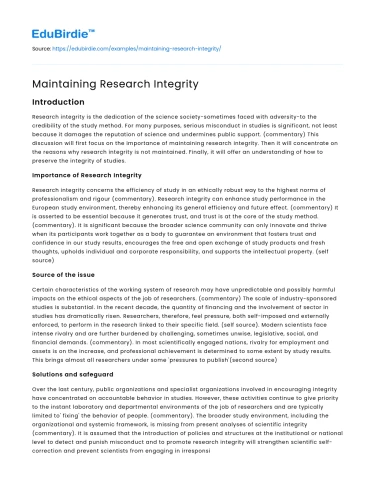Introduction
Research integrity is the dedication of the science society-sometimes faced with adversity-to the credibility of the study method. For many purposes, serious misconduct in studies is significant, not least because it damages the reputation of science and undermines public support. (commentary) This discussion will first focus on the importance of maintaining research integrity. Then it will concentrate on the reasons why research integrity is not maintained. Finally, it will offer an understanding of how to preserve the integrity of studies.
Importance of Research Integrity
Research integrity concerns the efficiency of study in an ethically robust way to the highest norms of professionalism and rigour (commentary). Research integrity can enhance study performance in the European study environment, thereby enhancing its general efficiency and future effect. (commentary) It is asserted to be essential because it generates trust, and trust is at the core of the study method. (commentary). It is significant because the broader science community can only innovate and thrive when its participants work together as a body to guarantee an environment that fosters trust and confidence in our study results, encourages the free and open exchange of study products and fresh thoughts, upholds individual and corporate responsibility, and supports the intellectual property. (self source)
Save your time!
We can take care of your essay
- Proper editing and formatting
- Free revision, title page, and bibliography
- Flexible prices and money-back guarantee
Source of the issue
Certain characteristics of the working system of research may have unpredictable and possibly harmful impacts on the ethical aspects of the job of researchers. (commentary) The scale of industry-sponsored studies is substantial. In the recent decade, the quantity of financing and the involvement of sector in studies has dramatically risen. Researchers, therefore, feel pressure, both self-imposed and externally enforced, to perform in the research linked to their specific field. (self source). Modern scientists face intense rivalry and are further burdened by challenging, sometimes unwise, legislative, social, and financial demands. (commentary). In most scientifically engaged nations, rivalry for employment and assets is on the increase, and professional achievement is determined to some extent by study results. This brings almost all researchers under some 'pressures to publish'(second source)
Solutions and safeguard
Over the last century, public organizations and specialist organizations involved in encouraging integrity have concentrated on accountable behavior in studies. However, these activities continue to give priority to the instant laboratory and departmental environments of the job of researchers and are typically limited to' fixing' the behavior of people. (commentary). The broader study environment, including the organizational and systemic framework, is missing from present analyses of scientific integrity (commentary). It is assumed that the introduction of policies and structures at the institutional or national level to detect and punish misconduct and to promote research integrity will strengthen scientific self-correction and prevent scientists from engaging in irresponsible behavior. (second source) The peer control system can assist in maintaining the integrity of studies. At the heart of the scientific method is the concept that transparent, open communication and mutual criticism are vital components of scientific self-correction. (second source)
Conclusion
Research integrity is a vital part of scientific society. Strategies to decrease pressure to publish may be ineffective as they are presently designed, while strategies and structures to address accusations of scientific misconduct, to promote transparency and mutual criticism between peers, and to strengthen the training and mentoring of young scientists could best safeguard the integrity of future science.






 Stuck on your essay?
Stuck on your essay?

